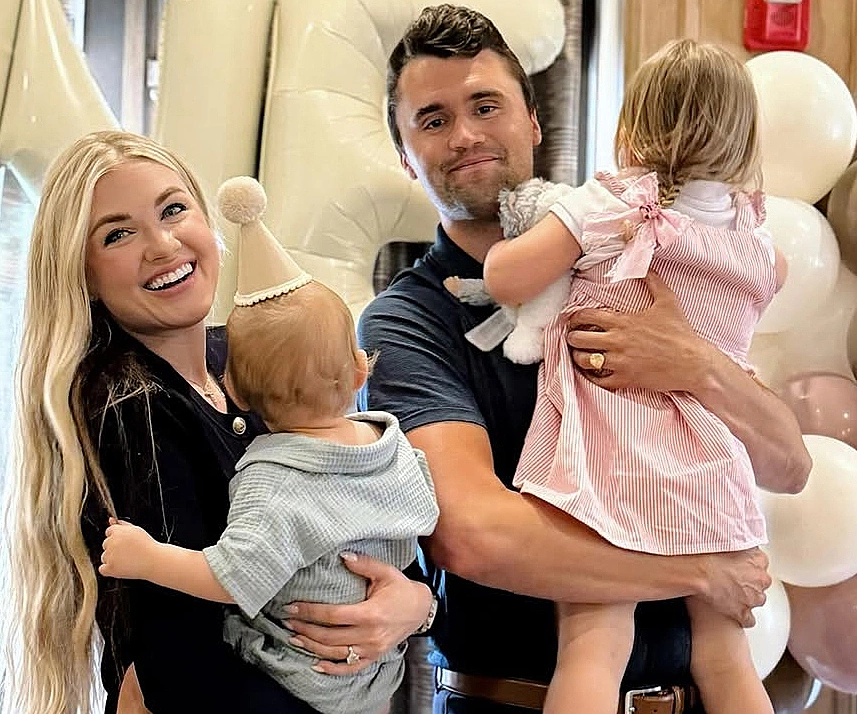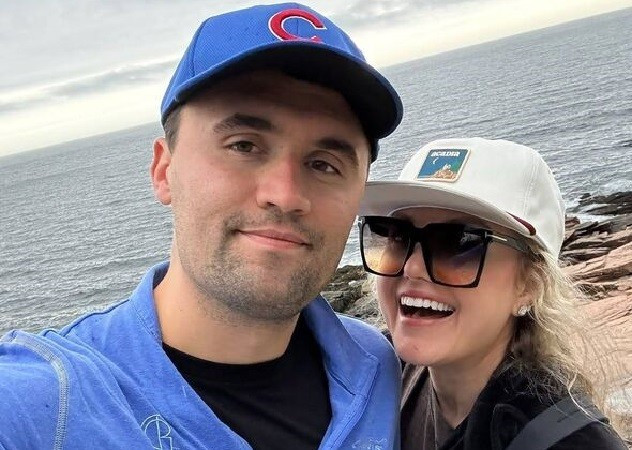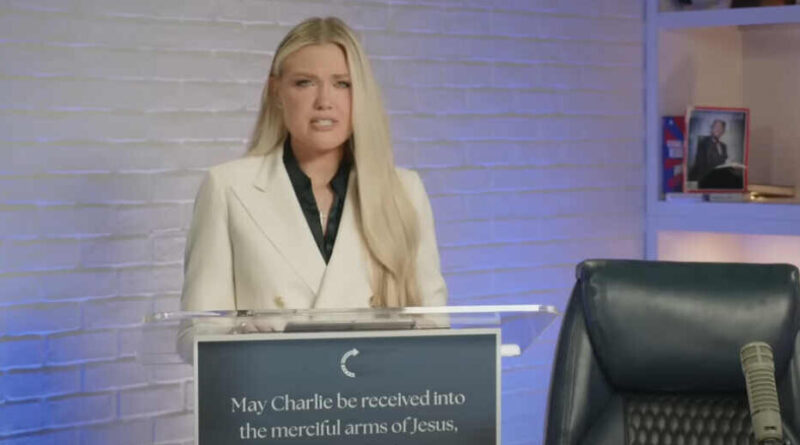It began as another routine morning outside the courthouse — reporters setting up, cameras rolling, and murmurs of another procedural update in the ongoing Charlie Kirk case, one that had already gripped the nation with suspicion, grief, and political tension. But when Candace Owens stepped forward and adjusted the microphone, silence fell. What she said next didn’t just add a new layer to the mystery surrounding Kirk’s death — it detonated it.
“I’m not here to accuse anyone,” Owens said, her tone steady but eyes burning. “I’m here to tell you something that’s worse than anyone imagined.”
In that moment, Owens turned a case about justice into a war over truth, loyalty, and legacy — and the person at the heart of it all wasn’t the shooter. It was the widow.
A Case Already Clouded in Shadows
When Charlie Kirk, the 31-year-old founder of Turning Point USA, was assassinated on September 10, 2025, America was left stunned. A rising star of conservative activism, Kirk was admired and criticized in equal measure — hailed by some as a champion of free speech and condemned by others as a provocateur of division.

But beyond the political theater, his death raised disturbing questions. Why was the alleged shooter never clearly identified? Why were critical documents sealed? Why were parts of Kirk’s private recordings — the so-called “Charlie Files” — either missing or heavily redacted when finally made public?
In the weeks after the tragedy, Erika Kirk, Charlie’s wife, became the emotional anchor of a movement in mourning. Through televised tributes and tearful interviews, she emerged as the symbol of resilience. She vowed to preserve her husband’s mission of faith and patriotism, founding Letter to America, a project to release Charlie’s final writings.
But according to Owens, what the public saw was only part of the truth.
Candace Owens Breaks the Silence
Candace Owens — commentator, author, and longtime friend of Charlie Kirk — had stayed quiet for weeks. Many assumed her silence was respect. But as she stood on those courthouse steps, her message was different: silence, she claimed, was protecting something deeper.
Owens alleged that “selective narratives” were being constructed around Charlie’s final days — that documents and recordings had been strategically filtered before reaching the public eye. And at the center of that filtration process, she suggested, was the widow herself.
“When truth becomes curated,” Owens declared, “it stops being truth. And what’s happening with Charlie’s story — it’s being curated.”
Her claim wasn’t a direct accusation, but rather a warning. Owens implied that the emotional image of a mourning widow may have concealed a complex machinery of control — one that decided which parts of Charlie’s message would survive, and which would vanish.
The Mystery of the Missing Files
For those following the case closely, Owens’s words struck a nerve. Ever since Erika Kirk’s announcement of Letter to America, whispers circulated among insiders that something was off.

Charlie Kirk had long kept exhaustive archives — hundreds of hours of recordings, draft speeches, and strategy memos. Yet only fragments were released, and many seemed edited. In one version of his final speech, an abrupt cut left out a passage where Kirk reportedly warned about “corruption within our own ranks.”
That single omission has become the subject of countless online debates. Was it a simple edit — or a deliberate erasure?
Sources close to the Kirk family told reporters that Erika had “full control” of the archives. And while her intentions may have been to protect her husband’s image, Owens’s revelation suggested that protection had turned into manipulation.
“Ask yourself,” Owens said, “why a man who spoke of transparency and truth would have his words censored — even in death.”
A Rift in the Conservative Movement
Owens’s statements didn’t just spark controversy — they split the conservative movement itself. Some hailed her courage, calling her a whistleblower. Others accused her of betrayal.
For years, Charlie Kirk and Candace Owens had been two pillars of the same ideological structure — outspoken, unapologetic, and fiercely loyal to their base. But now, Owens seemed to be dismantling that very foundation.
Turning Point USA quickly issued a brief response:
“We are aware of Ms. Owens’s comments and will not be engaging in speculation. Our focus remains on honoring Charlie’s legacy.”
Behind closed doors, however, insiders described “growing panic.” If Owens possessed evidence of tampering — emails, texts, or recordings — the repercussions could devastate reputations and careers.
Political analysts were quick to note that Owens’s move wasn’t just personal — it was strategic. By positioning herself as a truth-teller against the machinery of spin, she had effectively challenged the establishment she once championed.

And that’s what made her revelation so explosive: it wasn’t just about Charlie Kirk’s death — it was about who controls his memory.
The Widow in the Spotlight
Until Owens spoke, Erika Kirk was untouchable — portrayed as the devoted wife who turned grief into activism. But Owens’s statement changed everything.
Now, journalists began revisiting inconsistencies in Erika’s public appearances: her avoidance of certain questions, her vague references to “ongoing investigations,” and her decision to delay the release of key recordings.
Some began to wonder if Erika’s silence was truly sorrow — or strategy.
Friends close to her describe her as “deeply hurt” by Owens’s remarks. One family member told reporters anonymously, “Erika loved Charlie. She’s protecting what he built, not hiding anything. Candace is playing politics with pain.”
Yet even sympathy couldn’t drown out the unease. If Owens was right, then Erika Kirk wasn’t just a grieving widow — she was the gatekeeper of a legacy, holding the keys to truths America wasn’t meant to hear.
The Politics of Legacy
At the heart of this storm lies a profound philosophical question: Who owns a legacy?
In modern America, the line between public truth and private narrative is dangerously thin. When a figure like Charlie Kirk dies, his words become property — emotional, political, and commercial. They shape movements, influence elections, and define the moral pulse of millions.
Owens’s outburst forced Americans to confront a hard reality — that even death can be politicized. That a man’s final message can be edited like a campaign ad. That grief can be repackaged as branding.
And in this digital age, the truth doesn’t disappear; it’s curated, optimized, and monetized.
Owens’s Gamble — and the Moral Cost
There’s no denying the courage — or the danger — in what Candace Owens did. She has effectively turned her back on powerful allies, risking everything on the belief that truth must trump loyalty.

But there’s also risk in her method. By implying without proving, by hinting without confirming, she’s opened a moral abyss. If her claims collapse under scrutiny, she’ll be branded as the woman who weaponized grief for headlines.
If they hold up, however, she will have done what few in Washington dare to do — expose the machinery that turns tragedy into propaganda.
A Nation Divided — and Waiting
Tonight, America sits divided — not between left and right, but between those who believe Candace Owens and those who believe Erika Kirk.
In online forums, believers are combing through old footage, transcripts, and archived speeches, searching for deleted passages or altered files. Meanwhile, critics argue that Owens’s “bombshell” is little more than a publicity stunt designed to reignite fading attention.
But even her detractors admit one thing: she’s made people care again. The nation is watching.
Because if even a fraction of what she implied is true, the Charlie Kirk case is no longer just about who pulled the trigger — it’s about who’s rewriting the story afterward.
Conclusion: Truth or Tragedy Rewritten
In the end, Candace Owens’s statement was not just an accusation — it was an awakening. It forced Americans to confront the uncomfortable possibility that truth is not always found in the courtroom, but in the silences between what’s said and what’s suppressed.
Charlie Kirk once built his reputation on transparency, conviction, and faith. Yet the aftermath of his death has become a mirror of everything he fought against — control, manipulation, and silence.
Candace Owens may have just opened that mirror for all to see.
And now, America has to decide whether to look away — or look deeper.



